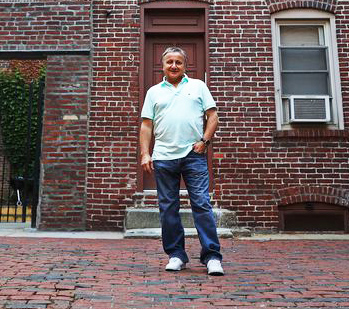Anthony Martignetti kisses his wife Ruth goodbye and opens the door of his second-floor apartment in West Roxbury. “I’m not coming home for lunch today, so no pasta,” he says with a wink. The two were married just two years ago and photos from their wedding fight for space on the walls of his small living room with photos of his teenage son from his first marriage.
He hustles down the stairs and next door to his parents’ house to check on them. They are each 91 years old. His mother has Alzheimer’s and he gives her a quick kiss, then goes looking for the drops he has to put in his father’s eye each morning. He is running late, but his father insists on showing him some massive zucchinis he just pulled from the garden.
From there it’s a short drive to Dedham District Court, where he works as an associate court officer at the security screening station just inside the front door. Anthony is 62 now, small, with short-cropped gray hair and none of the strangers who pass through his metal detector each day recognize him. No one does anymore, at least not by face. His uniform does not include a name tag, which is probably a good thing because for people of a certain age, his name is still capable of causing a minor commotion.
Anthony Martignetti. That name. When people recognize it, there’s always a pause, he says. A hesitation. Then they take a second look at his face. “You’re not that Anthony Martignetti? The kid from the spaghetti commercial!”
When he confirms that he is indeed that Anthony Martignetti, he knows what will then follow. It has been going on for 50 years!
They yell “Anthony! Anthony!”
Anthony Martignetti was nine years old when his family emigrated from Italy to the United States in 1966. They settled in a predominantly Italian neighborhood in Boston’s North End. It was there, three years later, that Anthony was hanging out with some friends when the group was approached by a pair of men who obviously did not live in the area.
They asked for directions to Commercial Street and Anthony politely guided the gentlemen. Those two men were representatives of Boston’s Jerome O’Leary Advertising Agency, which represented the Prince Macaroni Company (as it was then called). They were scouting locations for a television commercial and two weeks later when they were casting it, they recalled the nice little boy named Anthony who had helped them out.
The two men tracked Anthony down and asked if he would like to be in a television commercial. Anthony dashed home and excitedly told his mother that he was going to be on TV. She immediately assumed the worst – that he’d gotten into trouble and was going to be on the six o’clock news! A few days later (after she’d calmed down and details were hammered out), contracts were signed and Anthony eventually made $25,000 for his mad dash to that apartment building on Powers Court.
The commercial opens with his “mother,” played by fellow North End local Mary Fiumara, yelling from a window on Powers Court for her son: “Anthony! Anthony!” Next, we see Anthony running home, dodging the pushcarts of the Haymarket, through a schoolyard and finally up Powers Court, as a narrator intones:
“Anthony Martignetti lives in Boston, in the Italian North End, the home of the Prince Spaghetti Company. Anthony knows a lot about Prince, because it’s something that grows you. Most days, Anthony takes his time going home, but today is Wednesday and in the North End of Boston, Wednesday is Prince Spaghetti day.”
The television commercial became a phenomenon, one that ran nationally for nearly 14 years and turned his name into an Italian American icon. Martignetti never said a word in his role. And he has lived a quiet life since, a way of respecting what those few seconds of screen time came to symbolize. The spot ran for so long that the scene it depicted, a free-range childhood in an old-school neighborhood, became a diorama of the way things used to be. Something quaint. Something beloved. Something lost.
“I always understood that it was larger than me, that I had a responsibility to preserve what that commercial meant to people,” Martignetti says. “I knew that if I got in trouble, little Anthony from the spaghetti commercial would be all over the paper.”
The one time his name appeared in the news was in 2004, in a court case in which he accused his supervisor at a Stop & Shop distribution center of constantly berating him with Italian ethnic slurs like “meatball.” The matter was settled out of court.
Anthony’s wife Ruth marvels at the way her husband handles his role as caretaker of this memory. “When we first started dating, I’d see strangers freak out and hug him and I’d say, ‘Why do you let them do that? They don’t know you,’ ” she says. But Anthony would always say, ‘They’ve known me for a long time.’





